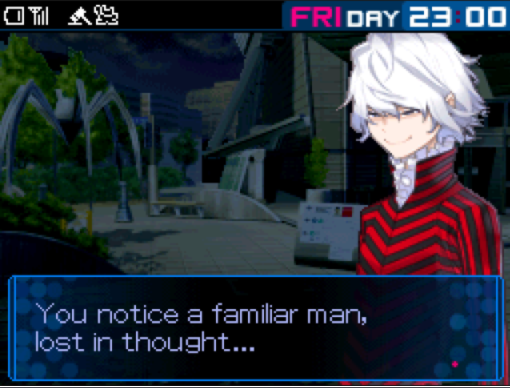BIODATA
Name: Anguished One, Alcor, Al Saiduq.
Age: Old as dirt (literally), physically in his late teens.
Canon: Devil Survivor 2.
Canon Point: Post-death; route negotiable.
Appearance: Here he is.
Birthday: N/A
Height/Weight: 5'7"/???
Canon Abilities: Another link for now.
History: So many links.
Personality: From the getgo, we're made aware that Alcor is a powerful, insightful, mysterious foe. Powerful as much as he's seemingly naive, Alcor's appearance is much more sinister than he truly is. Not to say he won't beat the crap out of an unruly demon with the snap of a finger, but he's preoccupied with the progress of mankind. His interests lie in their prosperity, despite finding them to be perplexing...also, despite watching humanity progress for a very long time.
He's a bit like a child that's watched National Geographic on mute for their entire existence or so.
Alcor's the first of his kind to sympathize with the human struggle. As a Septentrione, his duty is to destroy the planet to make way for another reality. Instead, he's taken on a human appearance and even mingles, communicates, alters certain circumstances, skewing them into their favor as much as he can so that they may prevail instead, even in all the chaos and conflict that's come about as a result of humankind.
Insincere in his appearance, Alcor can come across as awkward, difficult to relate to. His emotions are a bit stunted and he's not entirely sure what feelings even are. Not to suggest he's an unfeeling doll. He's almost always
inquiring in his undertakings, eternally curious of humans and human culture (as well as all things surrounding it) and eager to learn. He loves humankind unconditionally, to the point where he provided a tool (a phone app) once the end trials began, where ordinary people could summon and employ the use of demons for survival, and so that they could fight back against the Septentriones (conventional weapons don't work on them), which, of course, includes himself. He's a quirky guy as enhanced by an ethereal nature he emits simply by being. Whether that makes him more likable or more fishy is a debatable, case-by-case thing.
His intentions are truly good, however, or meant to be inferred as such. He's quick to provide the protagonist with helpful hints on how to defeat the Septentriones -- preferring to offer clues and hints instead of blatantly solving everything of his own accord, as that would conflict with his own ideals. It's later revealed in his backstory that he was the one to provide humanity with fire, culture and language during ancient times, mirroring the story of Prometheus. It's even in his name; The Arabic name for Alcor means "forgotten one" or "neglected one," reflected in how Alcor drifted away from Polaris and the Septentriones and thus developed a different view on human life from them. It's been a lonely path, but one he deems to be 'most correct.' He normally keeps humans at arm's length, supposing they wouldn't trust him should his true nature as a Septentrione be revealed. On the other hand, should a bond be forged, he'd be willing to sacrifice himself for that person.
0 to 100, I know.
He's captivated by humanity from the jump; humans, who operate under free will and are dominated by no godlike entities.
It's further expressed in his name 'the Anguished One'; it originates from the mere fact that he's allowed the planet to fall into corruption and be deemed purgable by Polaris. He feels guilty, as the pioneer to show them potentially destructive tools (fire!) and such, and thus his desire to help out is unnecessarily redoubled (he's already fully devoted to humanity...). Similarly, any self-regard he should have for himself is nonexistent. He's not at all proud of who he is -- what he is or what he's capable of, rather, and in spite of all he's done for humanity and what he continues to do, he cares very little for himself. Another antagonist refers to him as variations of 'a monster', which he simply accepts, and he can't wrap his head around the concept of others mourning his demise (which admittedly has a lot to do with his clinical thought process).



